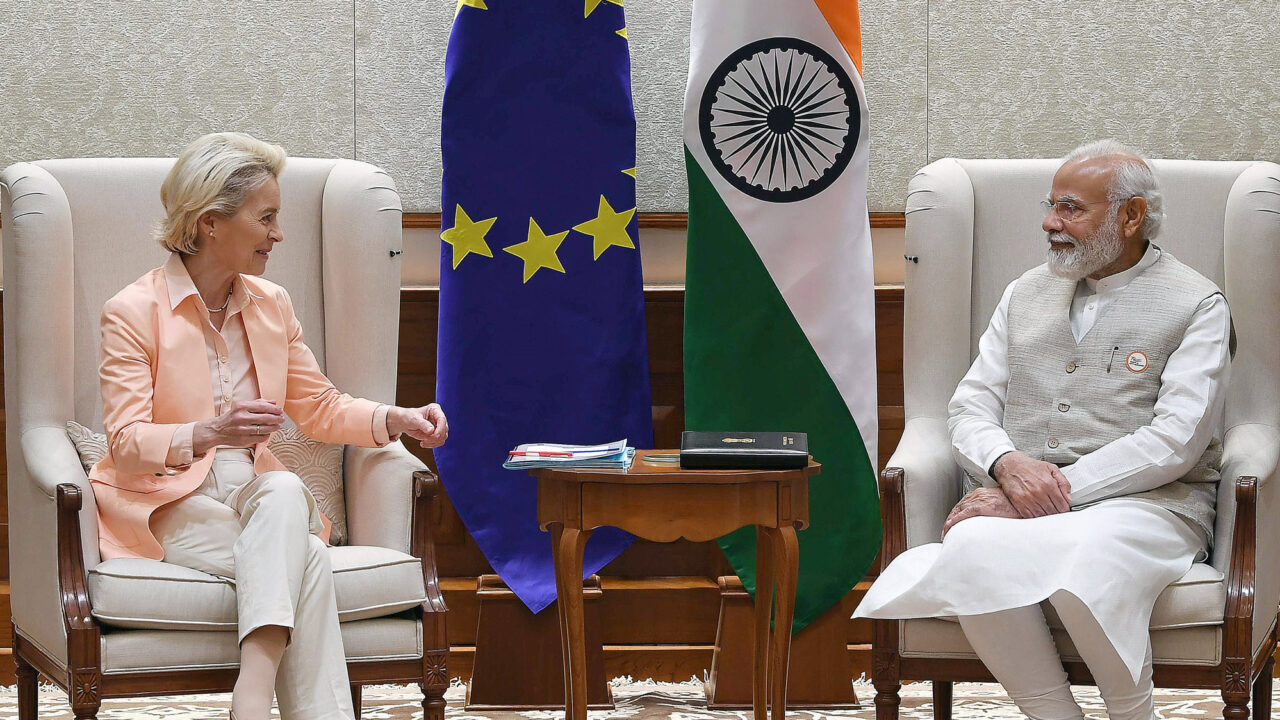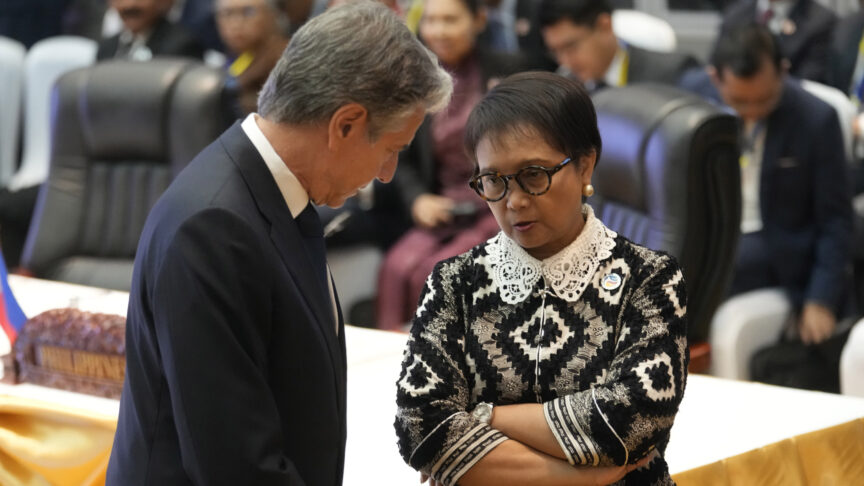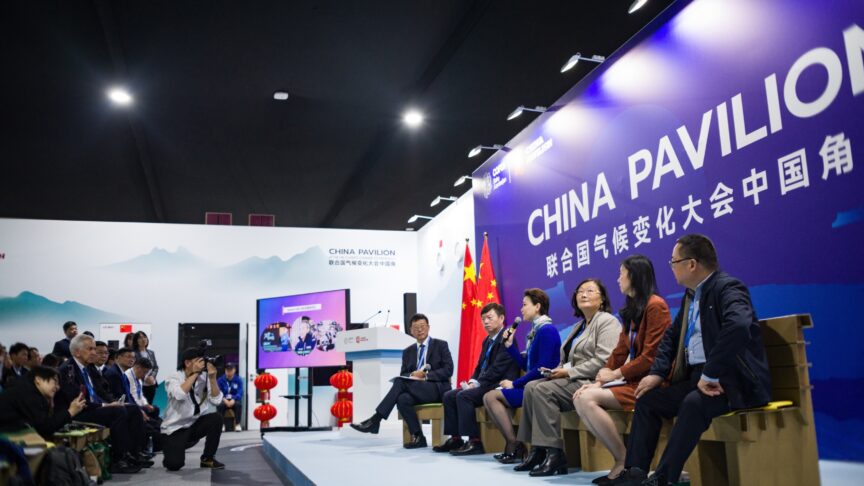Rebooting EU-India relations: How to unlock post-election potential
Ties between Brussels and New Delhi have long struggled to reach their potential. After their respective elections, shared geopolitical concerns about China and common goals on topics from technology to economic security can provide a chance for a reboot
The European Union’s relationship with India has long been high on promise, short on delivery. Speaking in 2022 in New Delhi, European Commission president Ursula von Der Leyen hailed a partnership “at the nexus of trade, trusted technology, and security”. Yet as the European Parliament recently noted, the EU-India bilateral relationship has “not yet reached its full potential”. To take one example, an important bilateral summit recently failed to materialise, as leaders from both sides chose to focus on their upcoming elections instead.
Back in 2020, the EU launched it’s “EU-India Strategic Partnership: A Roadmap to 2025”. That strategy is now in need of a reboot, and their respective elections are a perfect opportunity to do so. Later this year a new set of political leaders will arrive in Brussels. A new government will also be in place in New Delhi, albeit one almost certainly still led by prime minister Narendra Modi. The recently postponed bilateral summit will then be rescheduled for early 2025. This is an ideal setting to launch a new five-year roadmap, and one which makes a more compelling and geopolitically realistic case for deeper EU-India ties that also address shared concerns over rising Chinese power.
Indian foreign policy has undergone a series of major strategic changes over the last decade, driven by New Delhi’s mounting unease over Beijing’s regional sway. To hedge against this risk, India has pursued a multi-aligned foreign and security policy. Modi has drawn closer to the West, most obviously the United States but also Indo-Pacific partners like Australia and Japan. Ties with Europe have deepened too, both with Brussels and with EU member states. The pace of these improved relations with Europeans have failed to keep up with that of the US, however. In part this has been because the EU has focused much of its energy on the potential for an EU-India free trade agreement (FTA), and relatively less on other areas of cooperation. Yet it would be unwise for Brussels to place too much weight on a potential FTA as the crux of a renewed relationship with New Delhi. Negotiations on this long-delayed trade plan have recently restarted, but they remain at an early and tentative stage, and substantial technical barriers to delivery remain.
Diplomatically, ties between the EU and India are still recovering from the latter’s equivocal reaction to Russia’s invasion of Ukraine in 2022. New Delhi’s insistence on maintaining its long-standing close ties to Moscow left many in Europe frustrated. That irritation went both ways, however. India’s influential minister for external affairs, Subrahmanyam Jaishankar, chided Europeans in 2022 for what he viewed as foreign policy double standards relating to Ukraine, arguing that “Europe has to grow out of the mindset that Europe’s problems are the world’s problems, but the world’s problems are not Europe’s problems.”
Common concerns about China provide a more promising basis for renewed EU-India dialogue. Yet even here the two sides have often struggled. To put it crudely, Europeans feel threatened by Russia but have often sought a balanced approach to China, as was clearly on view during the recent visit of German chancellor Olaf Scholz to Beijing. India’s instinct has been precisely the opposite, feeling threatened by China but seeking continued ties with Russia. Both sides share concerns about deepening ties between Beijing and Moscow, but they have generally failed to find concrete ways to cooperate on blunting these threats.
To put it crudely, Europeans feel threatened by Russia but have often sought a balanced approach to China. India’s instinct has been precisely the opposite, feeling threatened by China but seeking continued ties with Russia
Despite this, there remains a significant opportunity for Europe and India to launch a more far-reaching partnership, rooted at the same intersection of trade, technology, and security that President von der Leyen identified in 2022.
On trade, New Delhi is actively looking for new economic partners. It has recently struck trade deals with nations like Australia and the United Arab Emirates, with whom it shares core geopolitical interests. It also signed a $100 billion FTA last month with the European Free Trade Association, a four-member bloc. Last year the EU overtook the US to become India’s largest trading partner with a total trade volume of $132 billion (compared to $128 billion between India and the US). Viewed in this light the potential for a larger EU-India free trade deal remains considerable, even if it will be formidably difficult to deliver in practice. Europeans should make a renewed effort to achieve it.
Common concerns over China’s threat to economic security provide one obvious new rationale for deeper cooperation. New Delhi runs a large and growing trade deficit with Beijing. It also remains heavily dependent on Chinese companies for strategically important inputs. In areas from solar panels to electronics, the EU and India would benefit if global supply chains relocated outside of China more quickly. Greater cooperation in areas like critical mineral supply chains would be useful for similar reasons. But making this happen requires more focus on bilateral investment promotion. India’s economy is growing quickly and attracting sizable foreign direct investment. Yet in 2020, the EU’s total investment stock in India had reached a relatively paltry €87 billion, or around a third of the €263 billion invested in Brazil. Fixing this imbalance requires action on India’s side to make its business environment more welcoming to the EU, while European leaders should push to speed up supply chain relocation.
Critical and emerging technologies provide a second rationale. The US has recently reinvigorated its relations with India with a focus on tech. In 2022 both sides launched the US–India initiative on Critical and Emerging Technology. In theory the EU should be able to push forward similar deals, driven by the powerful new Trade and Technology Council (TTC), rolled out by President von der Leyen during her visit to New Delhi in 2022. Yet so far, the TTC has struggled to deliver. Higher-level buy-in on both sides could help to re-energise it next year, most obviously by ensuring a greater focus on the second ‘T’, rather than the first. The recent 2023 EU-India memorandum of understanding on semiconductors provides a useful high-level template for similar cooperation in areas like quantum computing or synthetic biology.
Defence and security provide a final area requiring greater focus. With the EU’s smaller defence capabilities, it cannot hope to emulate the scale of the United States’ deep defence cooperation with India. But the EU did recently announce plans to develop a new generation defence and security deal with Japan. Another with South Korea is likely. These deals underline Europeans’ heightened focus on defence and the rapid development of the EU’s defence and security capabilities in the aftermath of Russia’s invasion of Ukraine. Put simply, the EU is now a more credible global security actor because of its involvement in Kyiv’s war effort. While a similarly ambitious deal with India would take time to plan and develop, it could plausibly be delivered within the terms of a future strategic partnership roadmap to 2030.
There are other new potential security partnerships too. Maritime cooperation in the western Indian Ocean is already well advanced. The EU also offers attractive capabilities in emerging domains like cyber and space. China’s ties with Russia remains a core mutual concern, and one that could be a more specific focus for intelligence sharing. The EU is likely later this year to create a new defence-focused position within the commission. Following this, the EU and India could create a more traditional “2+2” model for defence and security discussions, in which the EU’s high representative and new defence commissioner could meet with India’s defence and external affairs ministers.
There will of course be barriers to be overcome. European leaders remain hopeful that India will grow less reliant on Russia, and signals in that direction from New Delhi would hasten a deeper partnership. India will continue to be sceptical about the EU’s relationship to China. Europeans also remains nervous about the decline of India’s democracy in recent years, and the extent to which this could limit future cooperation. There will also be many other important elements to any future partnership, not least the critical green transition, where among other things, the EU needs to manage the introduction of its new Carbon Border Adjustment Mechanism, which has irked many in New Delhi.
Nonetheless the three areas above – trade, technology, and security – provide a compelling basis for a renewed EU-India partnership. Ultimately, such a partnership must respond to fundamental strategic realities. A truly geopolitical EU would recognise that stronger ties with India can achieve core objectives, such as protecting economic security and fostering economic de-risking amid rising anxiety over Chinese power. Uncertainty about future US foreign policy in the run-up to the 2024 election should also lead both sides to view deeper mutual ties as a useful geopolitical hedge, allowing each other to de-risk their respective relations with the US. Viewed from Brussels, these blunt geopolitical realities should provide the rationale for an EU-India relationship whose potential is finally matched by delivery.
The European Council on Foreign Relations does not take collective positions. ECFR publications only represent the views of their individual authors.



